The High Commissioner for Refugees, António Guterres expresses his shock about this  morning’s mortar attack on Camp Liberty in Iraq that reportedly killed six and wounded dozens.
morning’s mortar attack on Camp Liberty in Iraq that reportedly killed six and wounded dozens.
"I strongly condemn this attack," Mr. Guterres said, noting that the residents of Camp Liberty are asylum seekers undergoing the refugee status determination process and thus entitled to international protection. "This is a despicable act of violence."
"I call on the Iraqi Government to do everything it can to guarantee security to the residents," he said. "The perpetrators must be found and brought to justice without delay," he said.
The High Commissioner also calls on all countries to help find urgent solutions for the Camp Liberty residents.
Mr. Guterres expresses his deep condolences to the families of the victims.
UN
Secretary-General Ban Ki-moon today strongly condemned a mortar attack on an Iranian exile camp near Iraq’s 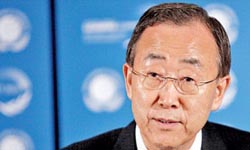 capital, Baghdad, which reportedly killed six people and injured several others.
capital, Baghdad, which reportedly killed six people and injured several others.
According to media reports, the Hurriya camp, formerly known as Camp Liberty, was attacked this morning while most of the residents were sleeping. Iraqi police officers were among the wounded.
The camp serves as a transit facility for more than 3,000 exiles, most of them members of a group known as the People’s Mojahedeen of Iran, where a process to determine their refugee status is being carried out by the Office of the UN High Commissioner for Refugees (UNHCR).
Camp residents were previously situated at Camp Ashraf in eastern Iraq, but were relocated last year, in line with an agreement signed in December 2011 between the UN and the Iraqi Government.
“The Secretary-General calls on the Government of Iraq, which is responsible for the safety and security of residents of both Camp Liberty and Camp Ashraf, to promptly and fully investigate the incident and bring perpetrators to justice,” said Mr. Ban’s spokesperson in a statement. “He has repeatedly stated that violence and provocation are unacceptable.”
Mr. Ban also reiterated the UN’s strong commitment to continue its long-standing efforts to facilitate a peaceful and durable solution for residents of both camps.
The High Commissioner for Refugees, António Guterres, expressed his shock about the attack calling it “a despicable act of violence.”
“I call on the Iraqi Government to do everything it can to guarantee security to the residents,” he said. “The perpetrators must be found and brought to justice without delay.”
In a news release, the UN Assistance Mission for Iraq (UNAMI) said it is closely liaising with the Government on the response to the incident, including medical assistance to the wounded.
Mr. Ban’s Special Representative in the country, Martin Kobler, has also asked Iraqi authorities to promptly conduct an investigation into the mortar explosions.
Ban Ki-moon demands investigation by Iraqi authorities into deadly attack on dissident base that left at least six dead. 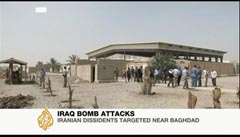
Ban Ki-moon, the UN secretary-general, has condemned a deadly attack on an Iranian dissident camp in the Iraqi capital and demanded an investigation by authorities.
"(Ban) strongly condemns the mortar attack today on Camp Liberty, the temporary transit facility near Baghdad for former residents of Camp Ashraf," his press office said in a statement after the attack on Saturday.
The US state department labelled the assault a "vicious and senseless terrorist attack," and called on Iraq to probe the attack and enhance security at the camp.
According to the Associated Press, at least six people were killed and dozens of others were injured when missiles struck the area occupied by the Mujahadeen e-Khalq (MEK) group near Baghdad.
A spokesman for the European Union foreign policy chief Catherine Ashton, also joined in the condemnation of the attack.
"We express our condolences to the families of the victims. We are concerned that it could add tension to the present situation in the camp," the EU spokesman said.
A spokesman for the interior ministry, however, said only one person had been killed and that reports of more deaths were "exaggerated".
There was no immediate claim of responsibility for the attack on the transit camp, a former American military base known as Camp Liberty, adjacent to Baghdad’s international airport.
The camp was the base that now-executed dictator Saddam Hussein allowed the group MEK to establish in Diyala province in the 1980s, during Iraq’s eight-year war with Iran.
Martin Kobler, the top UN official in Iraq, told Al Jazeera that he was "shocked" by the attack.
"These people have to be protected," he said, calling on Iraqi authorities to "promptly conduct an investigation".
‘Terrorist group’
The camp is home to more than 1,000 residents from the MEK who were moved last year, on Iraq’s insistence, from their historic paramilitary camp of the 1980s – Camp Ashraf.
The MEK was founded in the 1960s to oppose the Shah of Iran, and after the 1979 Islamic revolution that overthrew him it took up arms against Iran’s rulers.
It says it has now laid down its arms and is working to overthrow the government in Tehran through peaceful means.
It is no longer welcome in Iraq under the Shia-led government that came to power after US-led forces invaded and toppled Saddam in 2003.
Al Jazeera’s Jane Arraf, reporting from Baghdad, said Iraq sees the MEK as a "terrorist group".
"They [MEK] say they’re in danger from the Iranians and the Iraqi government," she said.
The UN intends to process them for refugee status in other countries but no country has so far welcomed them.
Britain struck the group off its terror list in June 2008, followed by the European Union in 2009 and the US in September 2012.
The US state department holds the group responsible, however, for the deaths of Iranians as well as US soldiers and civilians from the 1970s into 2001.
The MEK has no support in Iran, and no connection to domestic opposition groups.
The SFF has written a letter concerning the latest developments in the Interim Transit Camp Liberty to Mr 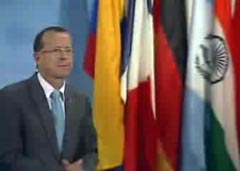 Martin Kobler, the Special Representative of the UN Secretary General to Iraq, which was handed over in person during a meeting.
Martin Kobler, the Special Representative of the UN Secretary General to Iraq, which was handed over in person during a meeting.
Mr Martin Kobler,
UNAMI, Baghdad, Iraq
Dear Mr Kobler,
With regards, we wish to share with you what we learned from some members of the MKO who very recently managed to escape from the camp and gain their freedom.
As you know, Camp Liberty has the area of one kilometer by one kilometer which is much smaller than Ashraf Garrison. The entrance contains check posts belonging to UNAMI and to the Government of Iraq separately. This place is now called ‘the triangle’ since the MKO has also established a post there.
All traffic in and out of the camp is controlled by the two posts of UNAMI and the GOI, and the third one, which belongs to the MKO, is merely keeping watch on these events and their job is to inform the various MKO units when the UN authorities are entering the camp. In this case residents in the unit that the officials are approaching are obliged to return to their dormitories and lock the doors and do not come out until they are told everything is clear. “Security reasons” is the excuse they give to the members for such a bizarre act.
When the UN officials enter the camp, the MKO post immediately warns leaders and they issue a state of alert to all units. In this situation, those residents who might try to contact the UN officials must be watched carefully and kept away. Everyone has been warned not to approach any visitor.
According to the information we have received, each unit of the Rajavi cult inside Camp Liberty has a legal and political liaison ‘representative’ who is the only person authorized to have contact with UN officials when they enter the camp. They are instructed to continuously complain about conditions in the camp. Everyone else must stay inside the dormitories until they are told to come out when the officials have left.
The MKO authorities say that they have been promised the same facilities they had in Ashraf and now they understand that this is because the UN wanted to separate off the discontented members. The MKO is following a policy of causing disruption in their present situation in an attempt to be allowed to return to Ashraf.
In this regard they have ordered the members to deliberately create terrible and unbearable conditions inside the camp and, according to them; if some die doing this it is worthwhile.
The Sahar Family Foundation which represents the ex-members and the families of trapped members of the MKO would like to urge you to deal with the above mentioned matters and make every effort so that:
1. The inhabitants of the camp have free access to the outside world, particularly to the UN officials who visit the camp;
2. The suffering families who have been waiting in Iraq for three years will be able to visit their loved ones.
Sahar Family Foundation
Baghdad, Feb 1, 2013
In an interview with Ashraf News, the UN Deputy Special Representative of the Secretary-General for Political Affairs in Iraq, Georgi Boston said that the delay in re-settling the MEK individuals in
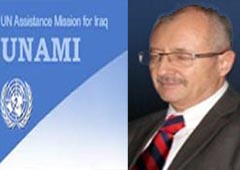 |
| Representative of the President of UNAMI: MEK terrorist organization previously hampered resettled outside Iraq |
European countries is because of their former association with terrorist activities. He added that the MEK is illegal in Iraq under the Iraqi constitution.
In an interview in his office in Baghdad, Georgi Boston said that "the United Nations is working earnestly to end the presence of the MEK organization there in coordination with the Iraqi government."
Georgi Boston said that the United Nations Mission discussed with the UN High Commissioner for Refugees (UNHCR) ways to resettle MEK members in other countries, pointing out that interviews will be conducted with residents of Camp Liberty in the coming days.
The UN official revealed that dozens of members of the organization who defected and surrendered to the Iraqi authorities will be given priority in the interview process and that the legal action to resettle them outside Iraq after they obtain refugee status in European countries has been discussed with them.
Georgi Boston strenuously refuted as unfounded accusations that UNAMI and in particular Martin Kobler acted as ‘tools of the Iraqi government to put pressure on the MEK’. He said Martin Kobler had sought from the outset to move individuals of the MEK to Camp Liberty on a voluntary basis, and that this process was overseen throughout by a delegation from the UN. He said the UN worked alongside the Iraqi authorities to fulfill their mutual agreement last year to close Camp Ashraf.
He went on to say that 47 individuals had split off from the MEK after arriving in Camp Liberty and surrendered to the Iraqi authorities. UNAMI had met with them and provided records to the UN High Commissioner for Refugees (UNHCR). In addition, there are others who had left the MEK while in Camp Ashraf.
Mr Boston rejected as false the MEK’s claims that after removal from the US terrorism list, the group would be able to stay in Iraq and be granted political asylum status there. He said the Government of Iraq has said this is impossible and asked us to accelerate the removal of the MEK. The MEK was involved in terrorist acts against Iraqis and was used by the former regime as a repressive tool against the Iraqi people.
Asked about the reluctance of some European countries to accept MEK members for resettlement, Mr Boston said that the MEK’s history of terrorist activities was hindering the process, but that the UN mission was working hard to find a solution to this problem. He stressed that in the meantime the UN had information on a daily basis on the status of the situation in Camp Liberty and its residents.
Translated by Iran Interlink
Dear UN Secretary General Ban Ki-moon,
The residents of the Mujahedin Khalq Organization’s headquarter in Iraq, Camp Ashraf moved to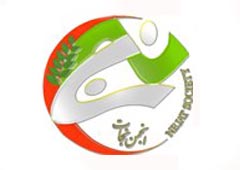 a Temporary Transit Location, Camp Liberty near Baghdad airport, according to the Memorandum of Understanding signed by UN special representative, Ambassador Martin Kobler and the Iraqi Government. Previously too reluctant to move to TTL (Camp Liberty), having settled down in the new site, the MKO leaders are now seeking the recognition of Liberty as Refugee Camp by the UN.
a Temporary Transit Location, Camp Liberty near Baghdad airport, according to the Memorandum of Understanding signed by UN special representative, Ambassador Martin Kobler and the Iraqi Government. Previously too reluctant to move to TTL (Camp Liberty), having settled down in the new site, the MKO leaders are now seeking the recognition of Liberty as Refugee Camp by the UN.
Regarding the testimonies of recently defected members, the leaders of the MKO are making efforts to maintain the manipulative controlling system of their cult-like group in Camp Liberty. They even do not allow the residents to use the facilities allocated to them by the UNHCR. Members are not allowed to use telephones, televisions. They have no access to the world outside the Cult of Rajavi, yet.
Systematic psychological pressure is heavily used against the Cult members. Manipulation sessions are held much more severely, according to escapees from Camp Liberty.
Members of the group are not permitted to visit their families who have been waiting to meet their loved ones in a free atmosphere, for so long.
Today, the leaders of the MKO seek to turn Camp Liberty to a small-size Camp Ashraf, with the same regulations and the same cult-like structure. They have ramped up suppression against members in order to prevent the collapse of the group. Thus, their last resort for the time being is to push the UN to recognize Liberty as a Refugee Camp. This way, they can prolong their stay in Iraq and eventually the structure of their cult-like organization.
Mr. Secretary General,
One of the most crucial rights deprived from the MKO members is the freedom to choose for their fate; to choose where to live; to choose where to go. Definitely, you and your respectable colleagues stand for individuals’ basic human rights but the leaders of the Cult of Rajavi continue to violate the members’ rights day and night. They intend to turn the temporary transit camp to a permanent refugee camp and ultimately another container for their cult of personality.
Do not allow the cult leaders to keep on abusing our loved ones mentally and physically imprisoned in their cult trap. Appreciating the acts of the UN Assistance Mission for Iraq in the evacuation of Camp Ashraf, we shall be pleased to see your prompt cooperation to aid the residents of TTL decide for their own future without the supervision of the MKO authorities.
Respectfully,
Nejat Society
Iraq: UN envoy flags improved Kuwait links, with progress depending on ‘restoration of confidence’
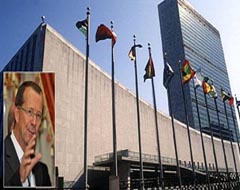
29 November 2012 – Highlighting improvements in relations between Iraq and Kuwait, the United Nations top official in Iraq today said that progress will “depend on the restoration of confidence between both sides” and encouraged further momentum from the two countries.
In a briefing to the Security Council on the situation in the Middle Eastern country, the Secretary-General’s Special Representative and head of the UN Assistance Mission for Iraq (UNAMI), Martin Kobler, noted how, earlier this year, Iraq demonstrated renewed commitment to improving its bilateral relations with Kuwait, and how he had “stepped-up” engagement with the two countries to see how the UN could best help resolve any outstanding issues in accordance with relevant Council resolutions.
“In this context, I recently held high-level meetings in Iraq and Kuwait where I was encouraged by the strong commitment that both Prime Minister Maliki and the Amir of Kuwait expressed to normalizing relations between their two countries,” Mr. Kobler said. “I very much hope that they will now be able to move quickly and they can count on the UN in this regard.”
Relations between the two countries were affected by Iraq’s 1990 invasion of Kuwait. The following year, the Security Council established the UN Compensation Commission (UNCC), which settles the damage claims of those who suffered losses in the invasion.
So far, the amount of compensation disbursed by the UNCC totals $37.7 billion for more than 1.5 million successful claims of individuals, corporations, Governments and international organizations. Successful claims are paid with funds drawn from the UN Compensation Fund, which is funded by a percentage of the proceeds generated by the export sales of Iraqi petroleum and petroleum products.
In his remarks, Mr. Kobler appealed to the Government of Iraq to “continue to demonstrate the goodwill necessary to fulfil Iraq’s other outstanding obligations, in particular to missing persons and property.” He noted how its commitment to fulfil these obligations will be conducive to the normalisation of relations between the two countries.
“I equally call on the Government of Kuwait to continue to act in a spirit of flexibility and reciprocity as reflected earlier this year by the important reciprocal visits of the Amir in Baghdad and Prime Minister Maliki in Kuwait,” he said, adding that he remains fully committed to working with both Governments to resolve bilateral issues, at their request.
In his briefing, in addition to a range of other issues related to Iraq, the envoy also addressed the situation affecting Iranian exiles located in a camp outside of the capital, Baghdad, urging the international community to come forward with offers for their resettlement.
“I wish to emphasize that Camp Liberty was only meant to be an interim facility to facilitate the Refugee Status Determination and subsequent resettlement in third countries,” the Secretary-General’s Special Representative and head of the UN Assistance Mission for Iraq (UNAMI), Martin Kobler, told a Security Council meeting on the situation in the Middle Eastern country.
“I should like to take this opportunity to reiterate the Secretary-General’s appeal to Member States to offer resettlement opportunities to former residents of Camp Ashraf – without such an undertaking, there can be no sustainable solution for the residents,” he added.
In line with a memorandum of understanding signed in December by the UN and the Iraqi Government to resolve the situation, more than 3,100 of the 3,280 residents originally in Camp Ashraf – now also known as Camp New Iraq – have been re-located to a temporary transit location near Baghdad, known as Camp Hurriya – and formerly known as Camp Liberty – where a process to determine refugee status is being carried out by the Office of the UN High Commissioner for Refugees (UNHCR). There are 100 residents left in Camp Ashraf.
The issue of Camp Ashraf – located in eastern Iraq and once made up of several thousand Iranian exiles, many of them members of a group known as the People’s Mojahedeen of Iran – has been one of the main issues dealt with by UNAMI for more than a year.
“The Government of Iraq insists to close Camp Ashraf in the next days,” Mr. Kobler said. “It requested the last 100 residents be relocated to Camp Hurriya.”
He noted that UNAMI has spared no effort over the last weeks to help facilitate meetings between involved parties – however, these efforts have been unsuccessful so far, leading to a stalemate.
“The Government of Iraq considers this stalemate as an attempt by the residents to delay the relocation of the remaining 100 persons,” Mr. Kobler said. “The Government of Iraq’s patience is, therefore, wearing thin. I call on the residents of Ashraf to cooperate with the Government of Iraq to solve all outstanding questions related to property.”
The envoy also called on the Government of Iraq to maintain the peaceful relocation of the residents as stipulated in the memorandum of understanding, to demonstrate restraint, and be as flexible as possible when it comes to resolving property-related issues.
In addition, he noted that UN staff who monitor the human rights and humanitarian situation of the residents of Camp Hurriya on a daily basis are often denied access to certain areas of the site which “hinders the performance of their duties.”
“I urge the residents to engage constructively with the Government of Iraq and the United Nations so that Camp Ashraf can be closed peacefully and efforts can focus on the residents’ resettlement to third countries,” he added.
U.N. chief Ban Ki-moon appealed on Thursday for countries to consider resettling several thousand Iranian dissidents living in Iraq who were recently moved to a former U.S. military base 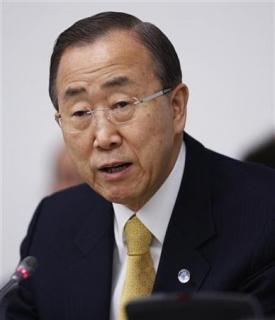 in Baghdad from a camp where they lived for decades.
in Baghdad from a camp where they lived for decades.
In a report to the Security Council, Ban said 3,112 members of the People’s Mujahideen Organization of Iran have been transferred to Camp Hurriya, leaving about 100 still at Camp Ashraf – also know as Camp New Iraq – to help close it down.
Ashraf residents agreed in February to move to the new camp, where the United Nations intends to process them for refugee status in other countries, but they have complained that the conditions at the new base are poor and that they have not been permitted to bring many of their personal belongings.
The group is no longer welcome in Iraq under the Shi’ite Muslim-led government that came to power after U.S.-led forces invaded and toppled Saddam in 2003. Clashes between Ashraf residents and Iraqi security forces last year killed 34 people.
Ban said so far only 31 people had been accepted by other countries and that it was now a matter of urgency that they be offered resettlement opportunities in other countries.
"Without the strong commitment of member states to accept former residents of Camp New Iraq, no sustainable solution can be achieved," Ban said in the report. "I appeal to member states to offer resettlement opportunities to residents with international protection needs as soon as possible."
In September the U.S. State Department removed the dissident group from its official list of terrorist organizations but underscored serious concerns about the group which is seeking to recast itself as an Iranian opposition force.
The group calls for the overthrow of Iran’s clerical leaders and fought alongside Saddam’s forces in the Iran-Iraq war in the 1980s. It also led a guerrilla campaign against the U.S.-backed Shah of Iran in the 1970s, including attacks on U.S. targets.
The group surrendered weapons to U.S. forces after the 2003 invasion of Iraq and the fate of Ashraf’s residents has been in question since Iraqi authorities took over the camp from U.S. forces in 2009 under a bilateral security pact.
Two sisters, 34 and 30, who have never met demand permission to visit one another
Mr. Ban Ki Moon
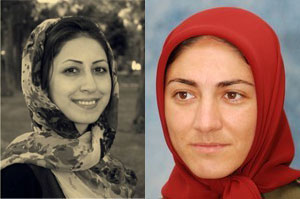 |
| R: Zainab Hussein-Nezhad, 34, single, living in MEK Camp Liberty in Iraq – Baghdad L: Mona Hussein-Nezhad, 30, married, living in Iran, These two sisters know about one another but have not yet seen each other |
UN General Secretary
With regards
I, Gorban-Ali Hussein-Nezhad, spent 30 years in the MEK (Mojahedin-e Khalq Organization) and managed to escape from Camp Liberty while moving from Ashraf Camp with the aid of UN human rights monitoring delegation, and gain my freedom.
I bear witness and wish to inform you and the international community that the MEK is by no means a freedom fighter and democracy seeking organization but a destructive mind control cult working against all internationally known humanitarian and democratic norms and values.
To give an example, the cult leader Massoud Rajavi, as a cultic practice to secure the existence of the cult and prevent it from elimination has banned all outside communications particularly family relations whether by phone or writing letters. In this organization contacting the outside world and especially family members is strictly forbidden. All means of gaining information such as papers, publications, television, radio, mobile, telephone, internet, post and etc. are banned and followers are only fed information through the cult’s own sources.
Through such limitations the cult has managed to keep more than 3000 individuals captive within their mental boundaries in a remote location in Iraq. Their families and the humanitarian organizations have accepted a great responsibility to rescue these individuals. Surely the UN has the biggest burden in this respect.
Dear Secretary General
The leader of the MEK had even prevented my elder daughter Zeynab Hussein-Nezhad (34) from talking to me while we were both inside the organization in Ashraf Camp. We were only allowed to visit once a year in the Iranian New Year (March 21) for about one or two hours where our conversation was totally controlled. This year this bas banned too and it is now more than one and a half years that I have not seen my daughter and have no news about her.
Recently I tried through the office of the UNHCR in Baghdad to visit her but I did not succeed. The UN officials brought her to their interview hall but the MKO leaders did not give the permission for the visit or even a telephone conversation and she was taken back to the camp. Following this, the cult forced my daughter to write a letter against me indicating that she has no desire to visit her father or talk to him.
Now my younger daughter Mona (30) who lives in Iran has come to Iraq to visit her older sister for the first time in their lives. I wish to ask you as the highest international authority, who strives to restore and maintain justice and human rights, to do all you can to ensure this visit to takes place. I also wish to ask the ICRC, the Iraqi Government, UNAMI, and the UNHCR to do their share to guarantee that these two sisters who are both in the same place now can visit each other and that the MEK leaders in Camp Liberty cannot place any obstacles in their way.
I thank you in advance.
Gorban-Ali Hussein-Nezhad – Baghdad
Sahar Family Foundation has written an open letter to Mr Ban Ki Moon, the UN Secretary General, and has sent the copies to the international media and the appropriate authorities.
The text of the letter is as follows:
Mr Ban Ki Moon,
UN Secretary General
With Regards
As the Mojahedin-e Khalq Organization (MKO) has eventually left Ashraf garrison and moved to Liberty transit camp, and the process of UN asylum registration has begun,
As the name of the MKO had been removed from the list of foreign terrorist organizations (FTO) in the US, Europe and Britain, and as Western countries no longer regard the MKO as a terrorist entity,
And as the suffering families of the members are still waiting in Iraq after almost three years to visit their loved ones and have not only not received any positive answer but have been insulted and accused and even harassed by the MKO elements,
We as the representative of the families of the members of the MKO in Iraq urge you to use your international capacity and:
Arrange for the meeting of the families with their loved ones in order to end their sufferings.
The news received from Camp Liberty indicates that the cultic relationships and standards are still imposed at their most intense. The members are told that they are bound to stay in Iraq and no one is allowed to leave. The members are also frightened about what the consequences would be if they leave the organization or seek to visit their families. The phobia of ‘extradition to Iran and facing torture and execution’ is systematically cultivated in the minds of the members.
The MKO authorities have clearly told the members that the National Liberation Army (Saddam Hussein’s private army of Rajavi) is the MKO’s sole capital investment and will never, under any circumstances, be given up. The leaders have emphasized that arms and weapons are not detachable from the MKO’s struggle.
As the obstacle of the FTO list has been removed and access by UN officials to the MKO members is much easier in Camp Liberty, there is no excuse for not arranging family meetings for the members. The families are eager to independently make sure about the physical and mental wellbeing of their loved ones.
The MKO is claiming that the members have chosen their destiny willingly and knowingly and that they have no desire to visit their families. There are many documents however which prove these individuals are systemically mind manipulated and their willpower has been psychologically robbed from them.
UN officials have the capacity to arrange these meetings without the interference of the MKO authorities. The same thing has been arranged in other parts of the world in the past. This excuse that the MKO leaders do not cooperate can no longer be acceptable and it is the duty of the UN officials to demand that the MKO leaders give the members their most basic human rights. If the leaders are refusing to do so, it is surely right for the UN to announce it publicly and not just in private meetings.
We wish to thank you in advance on behalf of the families.
Sahar Family Foundation
Baghdad, October 10, 2012
Copies to:
Mr Martin Kobler and the UNAMI
Iraqi ministry of human rights
ICRC in Iraq
US Ambassador to Iraq
International and Iraqi media
